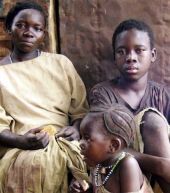Sudanese pray peace will return abducted relatives
By Wangui Kanina
OLD FANGAK, Sudan, April 23 (Reuters) – Southern Sudanese are demanding freedom for loved ones believed kidnapped as human shields in one of the most widespread abuses of a civil war supposed to have ended under a January peace deal.

|
|
Susana John, 22 and her daughter of 4 and an unidentified relative are seen in Wau, southern Sudan Wednesday March 2, 2005. John’s husband was killed in September, 2001 in fighting over the town of Raja, northwest of Wau. (AP). |
Residents of Old Fangak, an isolated Upper Nile State settlement, told reporters the deal between the government and the former rebel Sudan People’s Liberation Army had raised hopes they could be reunited with their relatives.
They added that the abductions had mostly been carried out by militia backed by the Islamist government.
Khartoum denies involvement in any abductions, and analysts note that the militia groups said to be responsible for most of the disappearances are not party to the peace deal.
Peter Ruai Kulnyang fought back tears as he recalled the kidnapping in 2001 of his wife and baby.
“The government soldiers and militia came on a barge, shooting heavily. I tried to grab my wife who was breastfeeding my baby but they got her before me and carried them onto the barge,” said the 37-year-old from the Nuer tribe in the central Sudanese village of Old Fangak.
“I have not seen them again,” he said.
His story resembles those told by thousands of others who lost relatives to kidnappers during the war in the oil-exporting south that is now winding down under a January peace accord.
Such accounts carry echoes of the slavery that was part of Sudan’s past where Arab slavers seized southern men, women and children in violent raids to be sold into servitude. The government denies slavery still exists in Sudan.
“The soldiers and militia came on a barge on the river, they were everywhere, then they took people and put them on their barge,” said John Nhial, who was also abducted.
“They beat me a lot and tortured me, hitting me with the gun, they removed my teeth,” he said, showing his gums where his bottom teeth had been knocked out. He later managed to escape.
Old Fangak residents want the international community to pressure the government to secure the release of loved ones.
Khartoum denies involvement. Asked about the kidnappings, an army source told Reuters: “The government and its militia forces never attacked or committed abuses against civilians.”
Under security arrangements set out under the deal, militia groups must join the either SPLA or government forces within 12 months of the signing. Aid groups say militias have yet to join either, and continue to harass and rob villagers.
Father Antonio La Braca, a Catholic missionary who has lived in the region for close to 10 years, told Reuters that the prisoners were mainly used as human shields in military towns to discourage the SPLA from attacking them.
They were also used as labour and some were forced to fight, he said.
Several residents said that although their wives and children had been freed, they were unable to return because of militia activity along the river, the main route to the village.
“They are scared to come back,” said Peter Kulnyang. “They fear that the militia who have set up in Fom (a town along the river) will recapture them.”
Several residents say that their relatives are in Malakal, a government-controlled town 120 km (80 miles) from the village but are either afraid to return or have no resources to do so.
“We are appealing to the international community and our government to please consider our plight and help us reunite our families now that there is peace”, another resident said.
